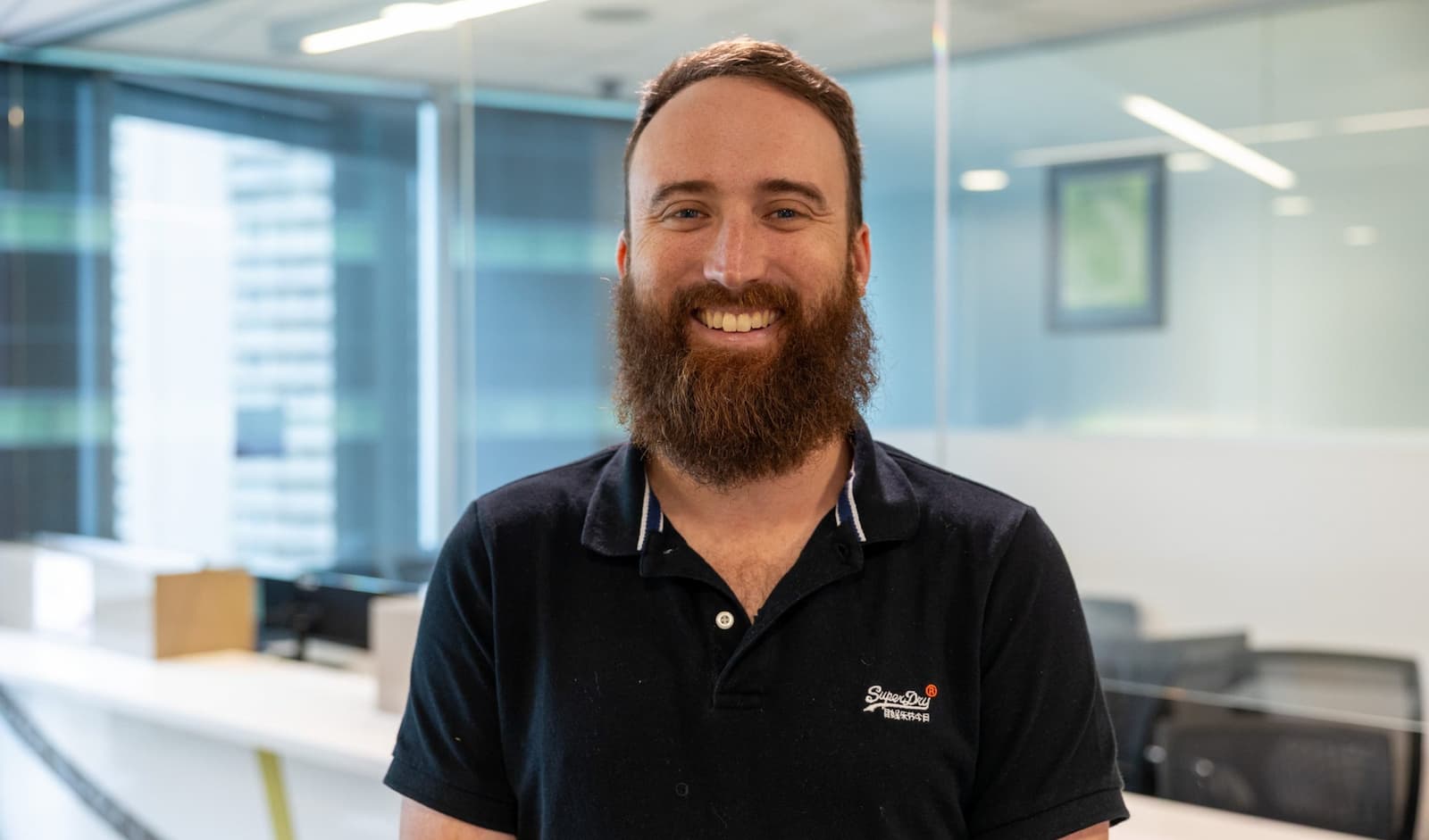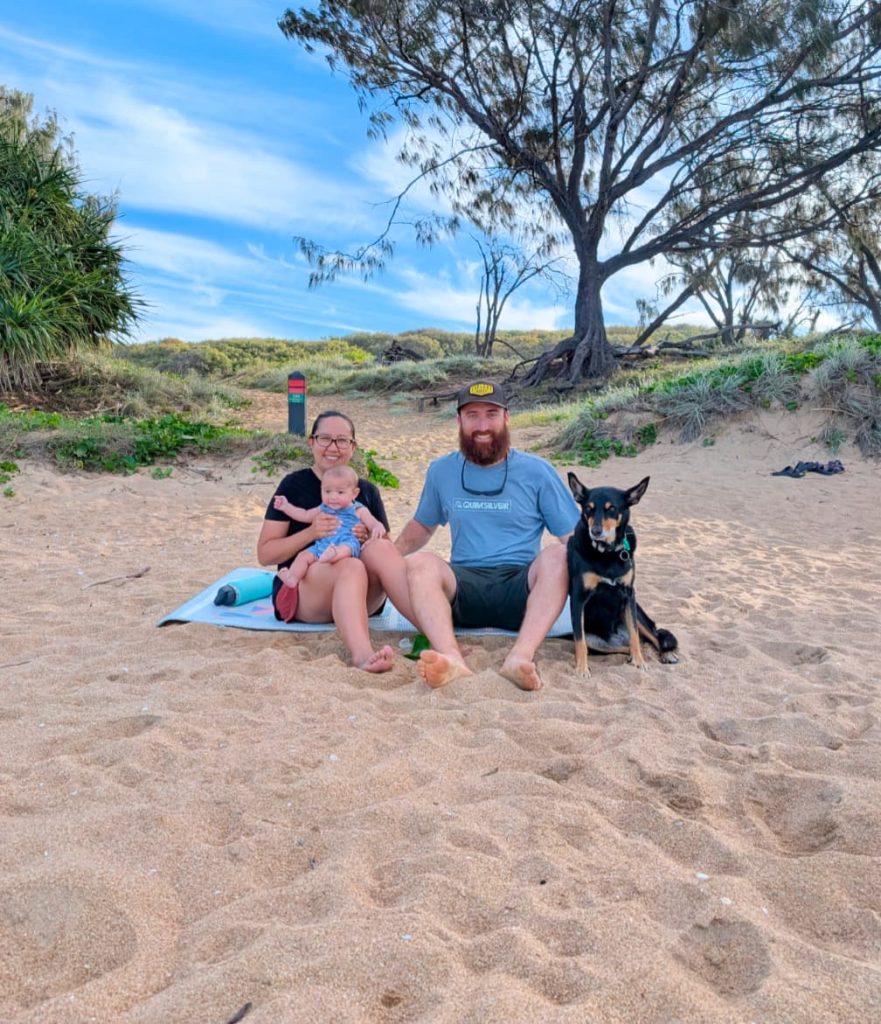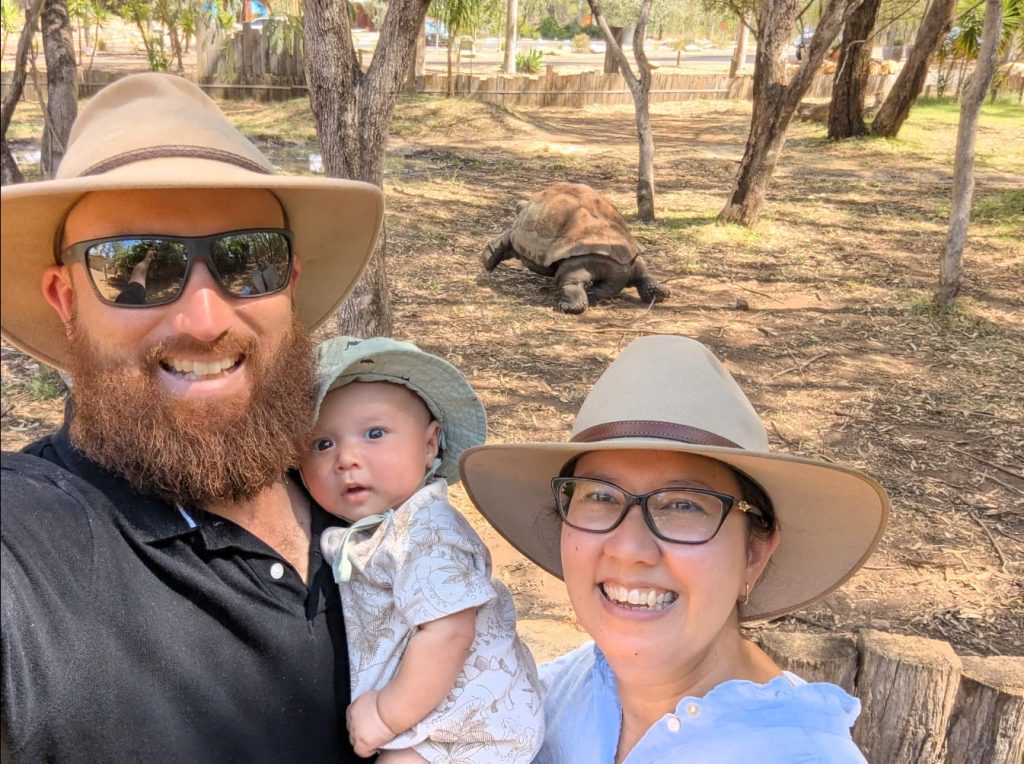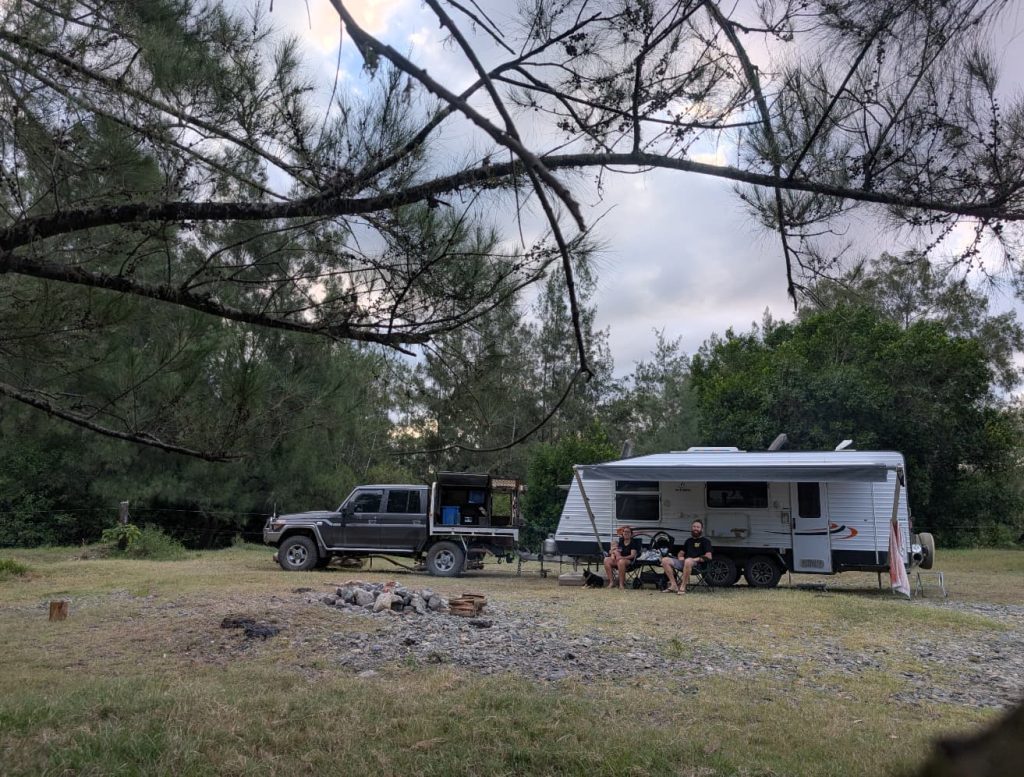Dave
May 22, 2025

In 2020, Dave, an electrician living in Weipa, experienced a life-altering motor vehicle accident, resulting in a traumatic brain injury (TBI) among other injuries. Now a National Injury Insurance Scheme Queensland (NIISQ) participant and Participant Reference Group (PRG) member, Dave recently reflected on his life post injury including the early days, returning to work and becoming a dad (his best role yet!).
Dave, wife Shaz and baby Theo are currently travelling around Australia in a caravan, aiming to discover and capture the most beautiful moments while settling into family life.
The early days
In the wake of a traumatic brain injury, Dave found openness to change and an understanding that returning to pre-injury ‘normal’ may not be possible or helpful in his recovery.
“Like most with acquired brain injuries, I initially dreamed of returning to ‘normal’. A doctor in the initial rehab days said to me, ‘Dave, there is no normal… your new normal is learning to adapt.’ It wasn’t until I got back to Weipa and tried the ‘normal’ thing that I realised it was never going to happen. That was a very powerful mantra that I lived my life around for the first few years of my injury,” Dave shared.
Life for Dave underwent significant changes post injury, including changing relationships and discovering new hobbies that brought him joy.
“My life changed post-injury. I lost 90% of my mates but made amazing new ones. My friendship circle now is so much healthier and more fulfilling than it ever was pre-injury,” he said.
“Find new hobbies. Hobbies that you can do. Even if you’re not perfect at them, it will give you enjoyment in participating.”
Dave emphasised the crucial role of compatibility with healthcare practitioners in his recovery process.
“Find a good neuropsychologist that you mesh with. I was very lucky that my neuropsychologist assessor on the Sunshine Coast kept in touch to see how I was travelling. Eventually she was able to provide her neuropsychology services which NIISQ was able to fund. This was an absolute lifesaver. I still have a session with her once a month, mostly as a maintenance thing. I’m very grateful for the hard times when I could reach out to her.”
Collating all documents relating to each stage of recovery proved beneficial for Dave. He recommends keeping anything and everything that relates to you and your injury.
“Make a large folder of it with many spare A4 plastic sheets. You’ll use this regularly when transitioning to many different health professionals. This way you can take the folder with you and give them access to anything they need. And you can also look back on it when your memory fails you.”
During the early stages of recovery, Dave found it beneficial to connect with others who had similar injuries.
“While you wouldn’t wish it on anyone, it’s really nice to meet people with similar challenges. You can ask questions and make suggestions,” Dave said.
“This will also allow you to feel more understood compared to your close family and friends that really do try to support and understand, but unfortunately they struggle to understand the complexities of TBI. If you’re in a remote area with not too many people, there are online networks that are similar.”
Returning to work
Dave has achieved several significant milestones since his injury, including regaining his driver’s license and returning to work.
“I was restricted to a C class license, which meant I lost my open HR license, but this was still a massive win at the time. With a license again I was able to start a return to work program.”
Returning to work as an electrician was a challenging process for Dave, as it highlighted the severity of his TBI.
“It wasn’t until I started back at work that I realised how significant my TBI is. Not getting along with work mates, not understanding the jobs, high fatigue and memory loss,” Dave recalls.
Despite these challenges, Dave has found a position that suits him and his condition through adjustments to his work schedule and role, and the development of his own tools to manage his tasks.
“When I first went back to work I started with four hour days for the first week, then extended the days by two hours each week until I was back up to twelve hour days.”
“I jumped across a few different roles until I found a role that better suited me; an Electrical Tech Officer. More off the tools and office-based, dealing with engineers, vendors, and training some of the newer electricians to the maintenance role. I’ve built my own tools to suit the job, using lots of Excel spreadsheets, OneNote, and photos.”
Living with TBI

For those progressing through recovery and into a lifetime management phase of living with TBI, Dave suggests continuing to work on injuries and being a support for those who are newer to the experience.
“Continue to work on your injury. As the years go on, you won’t see the improvements anymore because they slow down. But if you keep working on it, occasionally something will happen and you’ll realise, ‘Oh wow, I never used to be able to do that!’ or, ‘Oh wow, I handled that situation really well!’” Dave said.
He also recommends looking for opportunities to share your experiences.
“I definitely suggest looking for opportunities for advocacy. I’m proud of the things I’ve done as a member of the NIISQ Participant Reference Group (PRG), volunteering as a consumer with lived experience for the Queensland Rehabilitation Clinical Network Steering Committee, participating in heaps of research and lots of others,” Dave said.
“This will give you another sense of belonging and make you feel really appreciated. It also helps others with similar injuries, just as it helped you through the initial stages.”
Becoming a dad: Looking to the future

Another significant event for Dave was finding love with his wife, Shaz, after his injury. Their love story took a delightful turn with the recent arrival of their beautiful baby, Theo. Currently enjoying parental leave, Dave and his family have embarked on an exciting journey, exploring the beauty of Australia in their caravan. Their mission is not only to discover the country’s most picturesque locations, but also to find the best coffee shops for Shaz.
Before baby Theo’s arrival, Dave and Shaz lived in remote Weipa in Far North Queensland. The start to family life spurred a change for the couple.
“We drove down to Sunshine Coast to have Theo. We got sick of bouncing around different houses, from Airbnbs, house sitting, parents’ houses and the like, and decided to buy a caravan so we could live our own life and still visit people when it suited. We didn’t want to go back to Weipa too soon as it’s too remote and will be difficult with no civilisation around.”
Dave continues to manage his TBI, with a particular focus on memory retention. His current goal is to remember their journey into parenthood and Theo’s early childhood.
“I’m continuing to work on my TBI symptoms. I want to be able to remember our parenthood journey and Theo hitting all the exciting milestones. I’m also learning how to manage high fatigue levels while looking after Theo,” he said.
“NIISQ has been great with supporting physio and exercise physio appointments in different locations, as well as allowing me to attend different gyms around the country to continue working on my rehab.”

Last updated: May 2025